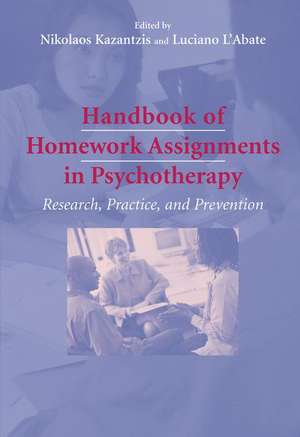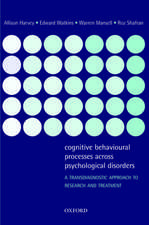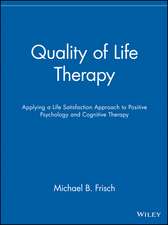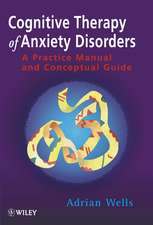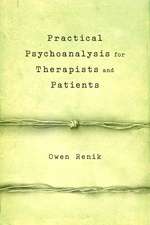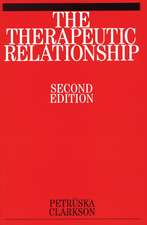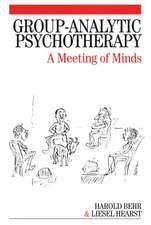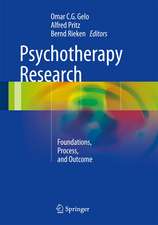Handbook of Homework Assignments in Psychotherapy: Research, Practice, and Prevention
Editat de Nikolaos Kazantzis, Luciano L'Abateen Limba Engleză Hardback – 15 aug 2006
| Toate formatele și edițiile | Preț | Express |
|---|---|---|
| Paperback (1) | 795.45 lei 6-8 săpt. | |
| Springer Us – 28 oct 2010 | 795.45 lei 6-8 săpt. | |
| Hardback (1) | 1120.05 lei 6-8 săpt. | |
| Springer Us – 15 aug 2006 | 1120.05 lei 6-8 săpt. |
Preț: 1120.05 lei
Preț vechi: 1178.99 lei
-5% Nou
Puncte Express: 1680
Preț estimativ în valută:
214.33€ • 229.18$ • 178.70£
214.33€ • 229.18$ • 178.70£
Carte tipărită la comandă
Livrare economică 17 aprilie-01 mai
Preluare comenzi: 021 569.72.76
Specificații
ISBN-13: 9780387296807
ISBN-10: 0387296808
Pagini: 464
Ilustrații: XVIII, 464 p.
Dimensiuni: 178 x 254 x 28 mm
Greutate: 1.06 kg
Ediția:2007
Editura: Springer Us
Colecția Springer
Locul publicării:New York, NY, United States
ISBN-10: 0387296808
Pagini: 464
Ilustrații: XVIII, 464 p.
Dimensiuni: 178 x 254 x 28 mm
Greutate: 1.06 kg
Ediția:2007
Editura: Springer Us
Colecția Springer
Locul publicării:New York, NY, United States
Public țintă
Professional/practitionerDescriere
The aim of this Handbook of Homework Assignments in Psychotherapy: Research, Pr- tice, and Prevention is to provide comprehensive resource on the role of homework assignments in psychotherapy and prevention. However, the process of generalizing in-session therapeutic work through between-session activity has a long history in psychotherapy. This Handbook is designed to elucidate and extend that history by presenting theoretical and clinically focused descriptions of the role of homework assignments in a range of psychotherapies, clinical populations, and presenting pr- lems. Designed for both the beginning and the experienced psychotherapy prac- tioner, this Handbook assumes a basic knowledge of psychopathology and practice of psychotherapy and prevention. The Handbook aims to contribute to the professional resources for all psychotherapy practitioners and researchers, in private and public practice, graduate students in clinical and counseling psychology, couple and f- ily therapists, as well as residents in psychiatry. This book does not aim to review the theories of psychotherapy in detail, speci?c treatments of psychopathology, cl- ical assessment, or basic psychotherapy and prevention processes that are currently available in numerous psychotherapy textbooks. This Handbook is a clinical resource designed to provide a focused coverage of how to integrate homework assignments into psychotherapy practice, and in the prevention of mental illness. Outline for the Handbook This Handbook comprises four distinct parts.
Cuprins
Brief behavioral marital therapy.- and Historical Overview.- Psychotherapy Approaches.- Behavior Therapy.- Client-Centered Therapy.- Cognitive Therapy.- Emotion-Focused Experiential Therapy.- Interpersonal Psychotherapy.- Psychodynamic Therapy.- Acceptance and Commitment Therapy.- Brief Strategic Family Therapy.- Personal Construct Therapy.- Client Populations.- Older Adults.- Couples.- Families.- Specific Problems.- Borderline Personality Disorder.- Chronic Depression.- Chronic Pain.- Eating Disorders.- Low Self-Esteem.- Obsessions and Compulsions.- Psychosis.- Sexual Dysfunction.- Substance Abuse.- Traumatic Brain Injury.- Directions for Research, Practice, and Prevention.- Directions for Research on Homework.- Directions for the Intergration of Homework In practice.- Directions for Homework in Psychotherapy Prevention.
Recenzii
From the reviews:
"Handbook of Homework Assignments in Psychotherapy presents multiple approaches to the integration of homework into therapy, including perspectives from nine theoretical orientations plus psychotherapy integration, as well as research and practical case examples. This inclusiveness is to be commended, as it lends to the overall strength and contributions of the work. … solid reference work with a broad perspective on homework that will likely become an essential component in the personal libraries of clinicians from all levels of experience as well as those of researchers." (Michele A. Schottenbauer, PsycCritiques, Vol. 52 (40), 2007)
"The Handbook of Homework Assignments in Psychotherapy: Research, Practice, and Prevention … provides readers with an extensive overview of how clinicians of various orientations integrate homework assignments into their clinical work with various popultions. … All chapters are well-organized, succinct, and written by experts in their respective fields. This book is geared towards clinicians working with adult populations. … This would be an excellent book for beginning clinicians or graduate students who are seeking an overview of various treatment approaches and clinical disorders." (Jeanne M. Duax, Journal of Contemporary Psychotherapy, Vol. 37, 2007)
"The book operationally defines ‘homework’ in various kinds of therapy … . is aimed at practitioners and researchers with all ranges of experience. … Readers looking for an ‘academic’ perspective on homework, a comparison of different approaches to between-session work, and inspiration in working with different populations will find a great deal here. … It really does represent a ‘first to market’ work that will be foundational for others interested in the theory and practise of psychotherapy homework, and certainly makes a very unique contribution." (Peter Bieling, Canadian Psychology, Vol. 49 (2), 2008)
"Handbook of Homework Assignments in Psychotherapy presents multiple approaches to the integration of homework into therapy, including perspectives from nine theoretical orientations plus psychotherapy integration, as well as research and practical case examples. This inclusiveness is to be commended, as it lends to the overall strength and contributions of the work. … solid reference work with a broad perspective on homework that will likely become an essential component in the personal libraries of clinicians from all levels of experience as well as those of researchers." (Michele A. Schottenbauer, PsycCritiques, Vol. 52 (40), 2007)
"The Handbook of Homework Assignments in Psychotherapy: Research, Practice, and Prevention … provides readers with an extensive overview of how clinicians of various orientations integrate homework assignments into their clinical work with various popultions. … All chapters are well-organized, succinct, and written by experts in their respective fields. This book is geared towards clinicians working with adult populations. … This would be an excellent book for beginning clinicians or graduate students who are seeking an overview of various treatment approaches and clinical disorders." (Jeanne M. Duax, Journal of Contemporary Psychotherapy, Vol. 37, 2007)
"The book operationally defines ‘homework’ in various kinds of therapy … . is aimed at practitioners and researchers with all ranges of experience. … Readers looking for an ‘academic’ perspective on homework, a comparison of different approaches to between-session work, and inspiration in working with different populations will find a great deal here. … It really does represent a ‘first to market’ work that will be foundational for others interested in the theory and practise of psychotherapy homework, and certainly makes a very unique contribution." (Peter Bieling, Canadian Psychology, Vol. 49 (2), 2008)
Notă biografică
Nikolaos Kazantzis, Ph.D., is faculty member at the School of Psychology, Massey University, Auckland, New Zealand. He has published widely on the topic of homework assignments in psychotherapy, including serving as a Guest Editor for special issues on this topic in the journals IN SESSION: Journal of Clinical Psychology (2002), Journal of Psychotherapy Integration (2006), and Cognitive and Behavioral Practice (2006). He has co-authored more than 40 articles and book chapters and has participated in national and international conferences related to his research interests. He is also a recipient of the Royal Society of New Zealand Science and Technology Award for Beginning Scientists, The Australian Association for Cognitive Behavior Therapy’s (AACBT) Tracy Goodall Early Career Award, and Massey University’s Research Medal – Early Career. Dr. Kazantzis is a licensed (registered) clinical psychologist and maintains a part-time practice in Auckland, New Zealand.
Luciano L’Abate, Ph.D., is Professor Emeritus of Psychology, Georgia State University, Georgia, Atlanta, USA where he was Director of the Family Psychology Training Program and the Family Study Center. He completed his Ph.D., at Duke University, with post-doctoral specialization at Michael Reese Hospital in Chicago. He worked in the Psychiatry Departments of Washington (St. Louis) and Emory (Atlanta) Universities Schools of Medicine before moving to Georgia State University, where he spent his entire academic career. He was in part-time private and consulting and clinical practice for 42 years. He has published (author, co-author, edited, and co-edited) 37 books, 3 are in press, as well as over 250 papers in scientific and professional journals.
Luciano L’Abate, Ph.D., is Professor Emeritus of Psychology, Georgia State University, Georgia, Atlanta, USA where he was Director of the Family Psychology Training Program and the Family Study Center. He completed his Ph.D., at Duke University, with post-doctoral specialization at Michael Reese Hospital in Chicago. He worked in the Psychiatry Departments of Washington (St. Louis) and Emory (Atlanta) Universities Schools of Medicine before moving to Georgia State University, where he spent his entire academic career. He was in part-time private and consulting and clinical practice for 42 years. He has published (author, co-author, edited, and co-edited) 37 books, 3 are in press, as well as over 250 papers in scientific and professional journals.
Textul de pe ultima copertă
The process of psychotherapy is essentially a means of helping patients to help themselves. As such, psychotherapy is not limited to the relatively brief in-session consultation time with the practitioner. Rather, patients' engagement in therapeutic activities between sessions has become an important part of the therapy process. Such activities, often termed 'homework', are central to ensuring that therapeutic goals are reached.
The Handbook of Homework in Psychotherapy is the first resource for the practicing clinician that addresses the role of homework across major therapeutic paradigms and complex clinical problems. It opens with a series of practice-orientated chapters on the role of homework in different psychotherapies (acceptance and commitment, client-centered, constructivist, cognitive-behavioral, experiential, family, interpersonal, psychodynamic) written by an international team of expert psychotherapy practitioner-researchers. Then, experienced practitioners present strategies, examples, and formulated assignments for use with different populations (couples, families, older adults) and complex problems (chronic depression, chronic pain, eating disorders, obsessions and compulsions, personality disorders, psychosis, sexual dysfunction, substance abuse, traumatic brain injury). The Handbook closes with three chapters by leading psychotherapy theoreticians, researchers, and practitioners that critique the available research evidence for homework, integrate the recommendations for using homework in practice, and also provide directions for homework's role in prevention.
Each chapter presents:
The Handbook of Homework in Psychotherapy is the first resource for the practicing clinician that addresses the role of homework across major therapeutic paradigms and complex clinical problems. It opens with a series of practice-orientated chapters on the role of homework in different psychotherapies (acceptance and commitment, client-centered, constructivist, cognitive-behavioral, experiential, family, interpersonal, psychodynamic) written by an international team of expert psychotherapy practitioner-researchers. Then, experienced practitioners present strategies, examples, and formulated assignments for use with different populations (couples, families, older adults) and complex problems (chronic depression, chronic pain, eating disorders, obsessions and compulsions, personality disorders, psychosis, sexual dysfunction, substance abuse, traumatic brain injury). The Handbook closes with three chapters by leading psychotherapy theoreticians, researchers, and practitioners that critique the available research evidence for homework, integrate the recommendations for using homework in practice, and also provide directions for homework's role in prevention.
Each chapter presents:
- A brief overview of the approach
- Review of existing empirical support
- Recommendations for practice
- Illustration of homework's role in practice and prevention through detailed case studies <
- Individualized use of homework, rather than a collection of "one-size-fits-all" assignments
Caracteristici
Shows clearly that between-session activities are a core component of psychotherapy practice
Covers a wide range of psychotherapy approaches, illustrating each with clinical examples
Includes valuable coverage of complex and chronic disorders
Synthesizes recommendations for future conceptual empirical work
Includes supplementary material: sn.pub/extras
Covers a wide range of psychotherapy approaches, illustrating each with clinical examples
Includes valuable coverage of complex and chronic disorders
Synthesizes recommendations for future conceptual empirical work
Includes supplementary material: sn.pub/extras
